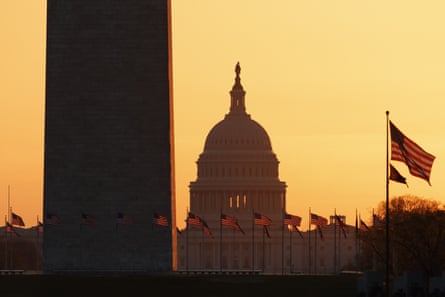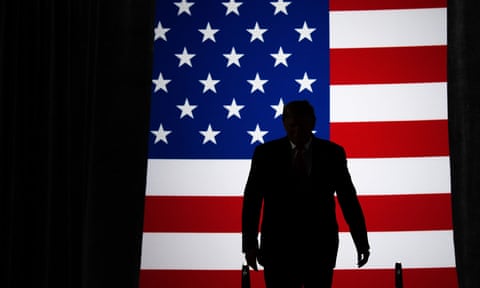When Donald Trump begrudged federal aid for Puerto Rico after Hurricane Maria, and for California during its deadly 2018 wildfires, and blamed those places for those natural disasters, even Republicans were shocked.
None could recall a president publicly complaining about the federal disaster relief role, or expressing resentment towards the victims.
It was possible at the time to see Trump’s conduct as exceptional, to write it down to narrow political resentments or racism. But now, with the coronavirus emergency hitting every state simultaneously, a fuller picture is on display.
“All I want them to do, very simple, I want them to be appreciative,” Trump has said of state governors.
And: “It’s a two-way street. They have to treat us well, also.”
And: “Frankly they were, many of the states, they were totally unprepared for this. So we had to go into the federal stockpile, but we’re not an ordering clerk. They have to have for themselves.”
Clashes between presidents and states are nothing new. But according to government theorists, public affairs experts and political analysts, Trump’s rattling of the federalist compact, by which the 50 states are both autonomous and bound in a national union, is unprecedented in modern times.
“You’ve redefined the role of state governors,” said David Super, a professor at Georgetown Law. “Governors must grovel to the president. Governor [Gavin] Newsom [of California], Governor Andrew Cuomo [of New York] have understood that, and they’re doing it. Governor [Gretchen] Whitmer has largely refused, and Michigan is going through hell as a result.
“These governors are more like provincial chiefs under this system, and if we want to restore federalism in this country we will have to make some very dramatic changes after this is over. If we don’t, federalism is dead.”

Experts voice concern that the fight between states over medical equipment that has broken out in the vacuum of federal leadership could make it harder for states to reach agreement later about how to reopen the economy. They warn that patchwork state plans for absentee voting and voting by mail in November could undermine the legitimacy of the presidential election.
In some cases they question what it will mean, once the coronavirus crisis has passed, to call the states autonomous, or for that matter to call them “united”.
If Trump tears up the parts of the federalist system he does not like, said political analyst Lincoln Mitchell, other parts that conservatives like a lot, such as the electoral college and the US Senate, could grow harder to defend.
That could be especially true, Mitchell, said, if the conservative majority on the US supreme court repeats its intervention of last week, when it blocked extended voting in Wisconsin in spite of the pandemic. Likewise if the presumptive Democratic presidential nominee, Joe Biden, like Hillary Clinton before him, wins the popular vote but loses in the electoral college.
“It is not inconceivable that Joe Biden could win this election by seven points in the popular vote and still lose the electoral college,” Mitchell said. “If that happens for the second time in a row, that is a crisis of governance – not a crisis of democracy, because it’s not a democratic system really – but a crisis of governance and a crisis of legitimacy.”
Super has coined the term “flippant federalism” to characterize how the White House is treating the governors. He referred to reports of incidents in which the federal government has intercepted ventilators and other equipment acquired by the states, which Trump appears to be handing out on a political patronage basis.
“On the one hand, they’re telling the states they’re on their own,” said Super. “On the other, they’re seizing the supplies that the states get on their own.”
Martin O’Malley, a former governor of Maryland and presidential candidate, has coined a different term: “Darwinian federalism”.
“His [Trump’s] behavior is not in keeping with the office of president,” O’Malley told the Guardian in an email. “The notion that governors have to bow down and praise him in order for their citizens to receive federal disaster assistance is contrary to the very nature of a republic.”

But Keith Whittington, a professor of politics at Princeton University specializing in constitutional theory, said Trump was correct in his assertion that states have traditionally been responsible for handling public health crises.
“It looks unusual relative to other countries that we are relying so heavily on state and local officials,” he said, “but that has been the American tradition.”
A national public health crisis is a rare occurrence, Whittington said, adding that statements by Trump and Jared Kushner were “really strange”.
In his sole public appearance during the crisis, the presidential son-in-law said: “The notion of the federal stockpile was, it’s supposed to be our stockpile. It’s not supposed to be states’ stockpiles that they then use.”
Whittington replied: “The national stockpiles are designed precisely in order to make them available to those who need them in moments of crisis. The attitude of this administration, and certainly Jared Kushner’s particular remarks on this, are pretty surprising and ultimately not very helpful.”
‘Lip service to federalism’
The story of the United States is a long one. Elasticity is built into the system. Looking ahead, everyone sees something different.
“I’d be surprised if what we’re seeing now results in a substantial permanent change in the relationship between the states and the federal government,” Whittington said.

Super said a drainage of power from the states, if it comes to that, would produce a more empowered federal government.
“The old argument against so-called big government is that states could do it,” Super said. “We’re here proving that they can’t.
“We’re also proving that whatever people once believed about the importance of states, they don’t believe it any more, and that federal politicians will pay lip service to federalism but show states no respect at all when it matters the most.”
In Mitchell’s view, other leaders of the conservative movement are unlike Trump, because they see practical value in shared economic prosperity and shared defense, and because they believe in the story that winds it all together: the story of America.
“They seem to be concerned enough that the United States of America survive in some form, whereas I don’t really get that sense with Trump,” Mitchell said. “Donald Trump’s goal is to keep him and the six people he cares about rich and out of jail. There’s nothing really beyond that that’s motivating him in a bigger picture.
“That’s not a good foundation on which to build a functioning country, let alone a functioning democracy.”
